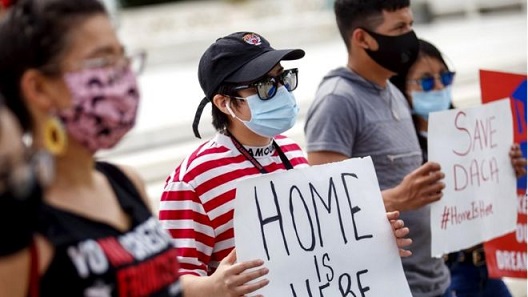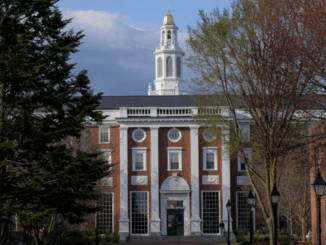
The US Supreme Court has ruled against President Donald Trump’s bid to end a major programme that protects young immigrants from deportation.
The justices upheld lower court rulings that found his move to rescind Deferred Action for Childhood Arrivals (Daca) was “unlawful”.
It protects “Dreamers”, about 650,000 young people who entered the US without documents as children.
The Trump administration has sought to end the Obama-era policy since 2017.
The Supreme Court took up the case after lower courts ruled that the Trump administration did not adequately explain why it was ending the programme, criticising the White House’s “capricious” explanations.
On Thursday, the justices voted 5-4 to uphold the lower courts’ findings that the administration’s order violated the Administrative Procedure Act, which says a government action cannot make policy that is “arbitrary, capricious, an abuse of discretion or otherwise not in accordance with law” or “unsupported by substantial evidence”.
What’s the reaction?
Mr Trump denounced the decision in a series of tweets.
“These horrible & politically charged decisions coming out of the Supreme Court are shotgun blasts into the face of people that are proud to call themselves Republicans or Conservative,” he wrote.
He called on voters to re-elect him in November to put more conservative judges in the court, should there be a vacancy.
He also suggested that he would renew efforts to end the programme and “start the process all over again”.
“Do you get the impression that the Supreme Court doesn’t like me?” he tweeted.
Former President Barack Obama praised the ruling and urged voters to elect a Democratic president and Congress in November to ensure “a system that’s truly worthy of this nation of immigrants once and for all”.
Joe Biden, the 2020 Democratic presidential nominee, said he would seek to make the programme permanent should he beat Mr Trump.
How has Trump fared at the Supreme Court?
Chief Justice John Roberts, often described as a conservative, sided with the court’s four liberals in Thursday’s majority ruling.
It marked the second time this week that Chief Justice Roberts has ruled against Mr Trump.
On Monday, the court ruled that gay and transgender workers are protected under federal employment law, a major victory for LGBT campaigners.
That decision was written by Justice Neil Gorsuch, a Trump appointee.
During his presidency, Mr Trump has appointed one other justice, Brett Kavanaugh. The Supreme Court’s bench is widely regarded as the most conservative in modern history.
Yet last year Chief Justice Roberts again joined his liberal-leaning counterparts in preventing the Trump administration from adding a question on citizenship to the 2020 census, which opponents had argued would suppress responses from immigrants and racial minorities.
The court has, however, sided with the Trump administration in two other major cases.
It defended the White House’s travel ban affecting mostly Muslim countries, and allowed Mr Trump’s ban on transgender people in the military to go into effect.
What is Daca?
Most of the children protected by the Daca programme are from Mexico and other Latin American countries.
A 2012 executive order, created by former President Obama, shields these so-called “Dreamers” from deportation, and provides work and study permits.
Mr Obama signed the order following failed negotiations for immigration reform on Capitol Hill.
In order to qualify for Daca, applicants under the age of 30 are required to submit personal information to the Department of Homeland Security (DHS), including addresses and phone numbers.
They must go through an FBI background check and have a clean criminal background, and either be in school, recently graduated or have been honourably discharged from the military.
In exchange, the US government agrees to “defer” any action on their immigration status for a period of two years.
It is only available to individuals residing in the US since 2007.
Daca recipients told the BBC they were relieved and surprised by the ruling on Thursday, and many said they would continue advocating for immigration reform.
Juana Guzman of Texas, 28, said: “It’s a very needed win and this is giving us the fuel we needed to continue moving forward and to keep fighting for the rest of our families and the community that does not have Daca”.
Metzli Sanchez, 23, said: “As big of a victory that this is, we have to keep applying pressure that we have to keep fighting for other people who are just as able and capable but who do not have this protection.”

Once again the Supreme Court has ruled that a controversial action by the Trump administration is illegal. And once again the biggest stumbling block for the White House isn’t that their officials lacked the power, it’s that they went about exercising them in the wrong way.
The Justice Department’s attempt to rescind Daca was “arbitrary and capricious”, the court held, in a way prohibited by federal law. That mirrors the court’s conclusion in a decision last year blocking the Trump administration’s efforts to include a citizenship question on the decennial US census.
Both opinions were written by Chief Justice John Roberts, whose technicality-minded devotion to a federal law is presenting an imposing obstacle to the administration’s policy objectives.
While the Trump team waged a lengthy court battle to have its Daca order upheld, there may be a few sighs of relief from the president’s campaign over this ruling. A Trump win would have pushed hundreds of thousands of Daca recipients into the economic shadows or onto deportation rolls just months before the November election. It would have put a sympathetic human face on the targets of administration’s hard-line immigration policies.
Instead, the Supreme Court has given Daca recipients a reprieve, leaving their ultimate fate still far from certain.
Read Anthony’s full analysis here
Source: bbc.co.uk






Be the first to comment